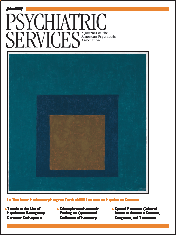Depression Among Latina Immigrant Mothers Separated From Their Children
Abstract
OBJECTIVE: Latinas who immigrate to the United States and leave their children in their homelands may experience psychological consequences of this separation. This study examined whether immigrant Latinas who were separated from their children differed in rates of probable major depression from those who lived with their children and from those who did not have any children. METHODS: Data were obtained between March 1997 and May 2002 from women in Women, Infants, and Children programs that target low-income pregnant and postpartum women and their children (up to five years of age), women in county-run Title X family planning clinics, women in pediatric clinics for low-income families, and women who were living in a subsidized-housing project or attending programs for county welfare recipients. Latinas in this study were all immigrants to the United States. The women were screened for major depressive disorders with the Primary Care Evaluation of Mental Disorders. RESULTS: A total of 5,122 Latina immigrants were screened. Overall, 11.7 percent of the sample screened positive for major depression. The rates of depression were 11.4 percent for women who lived with their children, 10.9 percent for those who did not have children, and 18.1 for those who were not living with their children. When the analyses controlled for demographic differences, the odds of depression for immigrant Latinas who were separated from their children were 1.52 times as great as the odds for those whose children were currently living with them (p=.02). Odds of depression were similar among women who lived with their children and those who did not have children. CONCLUSIONS: Separation from children during immigration may lead to increased risk of depression for immigrant Latinas. Health care clinicians who treat young immigrant women should pay close attention to signs of depression among women who have left children with relatives in their homelands.



